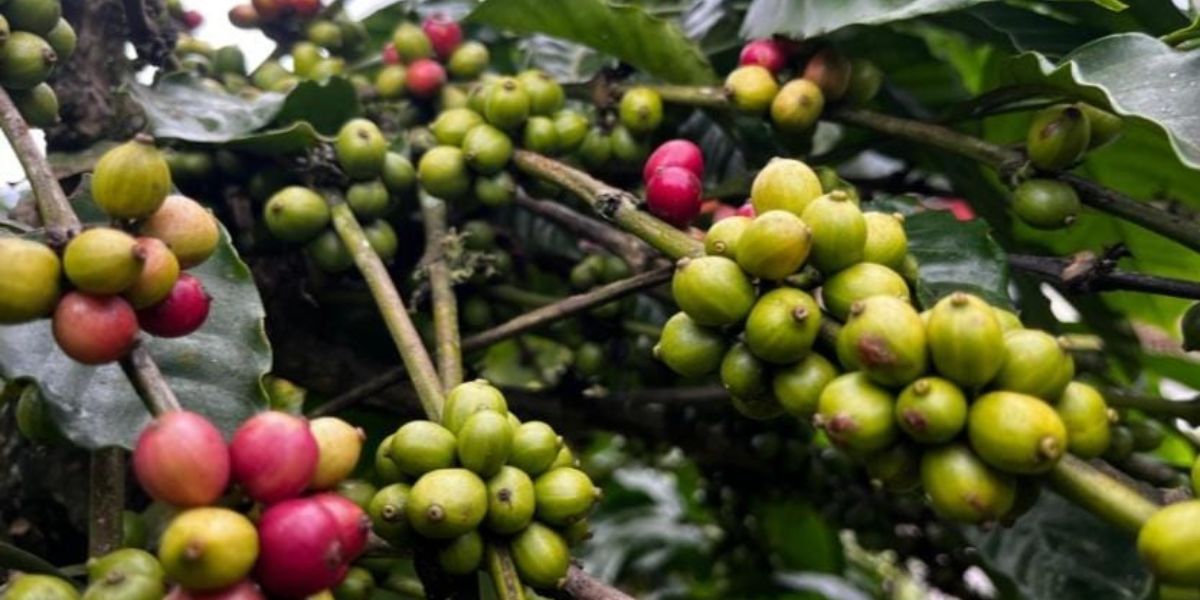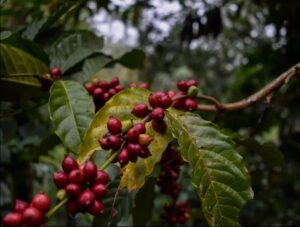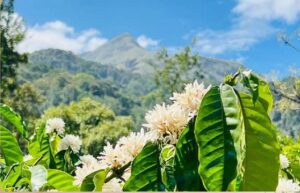Published Jul 20, 2025 | 7:00 PM ⚊ Updated Jul 20, 2025 | 7:00 PM

Wayanad robusta coffee beans.
Synopsis: Once seen as just another commercial crop, Wayanad Robusta is now winning over international buyers. Wayanad Robusta is not only boosting the district’s agricultural economy but also gaining global attention. The Kerala government is charting a bold course for sustainable agriculture and premium coffee branding through the upcoming Carbon Neutral Coffee Park in Wayanad.
In the mist-covered hills of Wayanad, a humble coffee bean is brewing big dreams. Wayanad Robusta, a distinct variety grown by nearly 60,000 farmers in the district, has earned a special mention at the National ODOP (One District One Product) Awards 2024 in the Districts (Agri Products) category — a recognition that signals its rising stature in India’s agri-export map.
Once seen as just another commercial crop, this robusta variant is now winning over international buyers and global coffee giants like Nescafe, thanks to its unique flavour profile, climate resilience, and sustainable cultivation practices.
As Kerala and various stakeholders rally behind it, Wayanad Robusta is fast transforming from a local staple into a global brew with purpose.
Wayanad’s tryst with coffee dates back to the early 19th century when the British East India Company introduced the crop to Kerala. The first plantations took root on the Ambukuthy hills of Mananthavady.
By 1841, Parry and Company of Madras established the large-scale Wayanad Coffee Plantations, marking the region’s rise as a coffee hub. And by 1869, half of South India’s 1,20,000 acres of Arabica plantations were in Wayanad.
However, this “golden era” ended with devastating pest and disease outbreaks.
To revive the sector, Robusta coffee (Coffea canephora), native to Sub-Saharan Africa, was introduced for its resilience in the second half of the 19th century.
The merit of Robusta is that it can withstand pest attacks and diseases compared to Arabica. Gradually, Arabica got replaced by Robusta.
Grown at elevations of 700–2,100 meters, Robusta thrived in Wayanad’s rich soil and shaded environment. It soon became the district’s dominant crop, now covering over 67,000 hectares and representing 90 percent of Kerala’s coffee cultivation.
Areas like Meppady, Poothadi, Kaniambetta, Noolpuzha, Ambalavayal, Thavinhal, Panamaram and Thirunellv Panchavats remain central to this legacy, rooted in colonial history and sustained by the land’s natural bounty.

Wayanad Robusta. (Kerala Tourism)
According to the Kerala Industries Department, Wayanad Robusta coffee stands out as a truly distinctive brew, shaped by the district’s unique geography, climate, and cultivation methods.
Nestled amid the lush, evergreen forests of the Western Ghats, Wayanad’s terrain offers the ideal microclimate — elevated altitudes, ample rainfall, and natural shade from native chola trees — for growing high-quality Robusta beans.
These environmental factors, coupled with traditional cultivation practices, lend Wayanad Robusta a signature profile: A soft to neutral cup, full-bodied texture, intense aroma, and subtle hints of chocolate.
Its superior crema-enhancing qualities make it a popular choice for blending with Arabica beans, especially in espresso preparations, where it contributes depth and lingering richness without overpowering flavour.
Recognising this uniqueness, the Geographical Indications (GI) Registry under the Ministry of Commerce and Industry granted Wayanad Robusta coffee the prestigious GI tag in 2019, cementing its reputation as a premium Indian coffee.
As Kerala’s primary coffee-growing region, Wayanad contributes significantly to the state’s annual output of over 67,000 tonnes of Robusta coffee, much of which is now in high demand both domestically and internationally. The government is also promoting Wayanad Carbon Neutral Coffee, further enhancing the bean’s environmental and market appeal.
Wayanad Robusta is not only boosting the district’s agricultural economy but also gaining global attention, with brands like Nescafe using it in their blends. With its unique flavour notes, sustainable cultivation, and rising brand value, Wayanad Robusta is slowly but steadily earning its place among the world’s finest coffees.
Wayanad Robusta recently added another feather to its cap by earning a coveted cup score of over 80 at the prestigious World Coffee Conference held in Copenhagen.
Making its global debut at the 2024 conference, this unique coffee from the highlands of Wayanad has already caught the attention of coffee connoisseurs worldwide.
Sensing its immense potential, the Industries Department is now exploring ways to elevate its status as “Wayanad’s Indian Fine Robusta (WIFR)” — a name said to be suggested by Sunalini Menon, a pioneer figure in coffee tasting.
The plan? To bring together small-scale coffee growers under a unified brand — much like the celebrated Amul model — to ensure better market access, fair pricing, and global recognition for this homegrown brew.

Coffee blooms in Wayanad. (WIFR)
Coffee-based farming is at the heart of Wayanad’s lush agricultural identity, where rolling plantations echo with the rustle of pepper vines and banana leaves.
With nearly 54 percent of the district’s land devoted to agriculture, coffee cultivation emerges as a lifeline, shaping the economy and culture of this hill district.
Robusta reigns supreme in Wayanad’s coffee story, accounting for over 95 percent of the region’s production. Grown under both rainfed and irrigated conditions, Robusta’s yield potential ranges from 1,400 to 2,500 kg per hectare.
However, the average productivity stands at 850 kg/ha for Robusta, while Arabica, cultivated to a much lesser extent, yields about 420 kg/ha.
What makes Wayanad’s coffee cultivation unique is its deep-rooted harmony with nature. Farmers there often intercrop coffee with spices, particularly pepper, and also with banana and arecanut, following natural and sustainable farming methods.
This mixed cropping model not only enhances biodiversity but also serves a dual purpose — providing shade for coffee plants and offering protection from pests and diseases without heavy reliance on chemicals. In Wayanad’s undulating terrain, small and marginal farmers are the backbone of this green revolution.
Their traditional knowledge, combined with eco-conscious practices, ensures the district’s continued reputation for producing flavourful and aromatic Robusta beans, admired by coffee connoisseurs globally.
The coffee harvest season, beginning in December and running through February, turns Wayanad into a buzzing hub of activity — the culmination of a year’s labour infused with hope, heritage, and the heady aroma of freshly picked beans.
For Wayanad, coffee isn’t just a crop — it’s a way of life.
G Balagopal, Project Lead of the Climate Smart Coffee Project, an initiative of K-DISC (Kerala Development and Innovation Strategic Council) and the Department of Industries, Government of Kerala, said sustained efforts are needed to elevate the lives and livelihoods of the farmers.
“Recognitions at global platforms like the World Coffee Conference or the ODOP (One District One Product) initiative are certainly reassuring — they confirm that our Robusta has global appeal. But let’s be clear: these are just small steps,” he stressed.
“For the small-scale coffee farmers of Wayanad, such achievements don’t immediately translate into tangible change. We need sustained efforts to elevate their lives and livelihoods,” he added.
Climate Smart Coffee Project proposes the aggregation of the Robusta produced in Wayanad and centralised processing to produce clean and roasted coffee of standard quality.
Balagopal pointed out to South First that Wayanad continues to face deep-rooted issues: “Farmers here are often denied fair prices, control over their harvest timing, and access to even basic knowledge about improving coffee quality.”
Despite Wayanad Robusta’s unique flavour profile, the region’s productivity remains the lowest in the country, at just 0.8 metric tonnes per hectare, compared to the Kerala average of over one metric tonne.
A fundamental problem, Balagopal explained, is the lack of scientific data: “Until recently, we didn’t even have a soil pH database for Wayanad. It was only with the help of students from the College of Agriculture, Wayanad, Ambalavayal, that we collected samples from over 100 locations. The findings confirmed what we suspected — acidic soil due to intense rainfall and nutrient washout. This calls for targeted soil amendments like adding dolomite and calcium.”
The Climate Smart Coffee Project is now working to bridge these gaps. “Initially, we’ve trained 300 coffee farmers with the support of the Coffee Board, introducing them to concepts like cup score — which measures 10 critical quality parameters, including moisture content — most of which small-scale farmers were completely unaware of,” he said.
One innovative approach the project used was tapping into the dairy farming network: “In Wayanad, dairy cooperatives are robust, and many dairy farmers also grow coffee. So, we used that existing network to reach out — it made knowledge transfer much easier.”
Looking ahead, Balagopal is hopeful: “What we need is a farmers’ movement — something akin to what we saw in Anand for milk. Only then can we truly transform the coffee sector in Wayanad.”
Meanwhile, the Kerala government is charting a bold course for sustainable agriculture and premium coffee branding through the upcoming Carbon Neutral Coffee Park in Wayanad.
Conceptualised under the Carbon Neutral Wayanad Programme, the project aims to transform Wayanad into a hub of fine Robusta coffee, with a strong emphasis on environmental sustainability and international standards.
The proposed Coffee Park, located near Kalpetta, will span 20 acres and serve as a centralised facility for high-quality coffee processing. By enhancing value realisation through branding and centralised processing, the state also aims to build an ecosystem of climate-smart agriculture and sustainable land management.
It’s learnt that land acquisition is already complete, and funds for the project have been sanctioned by the Kerala Infrastructure Investment Fund Board (KIIFB).
The next step — the preparation of a Detailed Project Report (DPR) — is currently underway. The proposal is expected to be taken up for discussion in the upcoming KIIFB board meeting, with the government working to expedite implementation.
Sources said the Coffee Park initiative will stand on three core pillars:
Tasting quality: Expert coffee tasters will be roped in to ensure that Wayanad Robusta meets global flavour profiles. Coffee that meets 80 percent of first-quality tasting standards will be prioritised for branding and export.
Product safety: The park will follow stringent safety protocols to meet European Union (EU) standards. Measures will be taken to eliminate pesticide and chemical residues, ensuring the product is safe and compliant with global food safety benchmarks.
Environmental sustainability: With tree-shade farming as a key component, the Coffee Park promotes sustainable agroforestry. This will also help meet the upcoming EU Deforestation Regulation, which comes into effect in January 2026. It’s said the EU will use satellite imagery to trace a product’s origin back to 2020, and any product linked to deforestation risks rejection.
To comply, the government plans to implement three tiers of certification and encourage farmers to adopt verified sustainable practices.
The protocol of WIFR is being formulated to align cultivation, processing, and export practices with international sustainability frameworks. The integrated approach, which combines silviculture, canopy development, and climate-resilient agriculture, is expected to position Kerala as a global leader in carbon-neutral speciality coffee.
As global consumers increasingly demand traceable, ethical, and sustainable products, Wayanad Robusta could set a new benchmark in India’s agri-export sector — blending tradition with technology, and aroma with accountability.
(Edited by Muhammed Fazil.)

